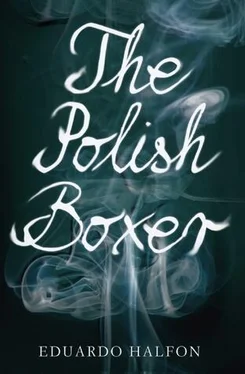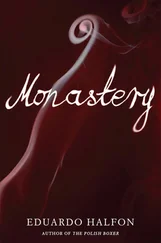Eduardo Halfon - The Polish Boxer
Здесь есть возможность читать онлайн «Eduardo Halfon - The Polish Boxer» весь текст электронной книги совершенно бесплатно (целиком полную версию без сокращений). В некоторых случаях можно слушать аудио, скачать через торрент в формате fb2 и присутствует краткое содержание. Год выпуска: 2012, Издательство: Bellevue Literary Press, Жанр: Современная проза, на английском языке. Описание произведения, (предисловие) а так же отзывы посетителей доступны на портале библиотеки ЛибКат.
- Название:The Polish Boxer
- Автор:
- Издательство:Bellevue Literary Press
- Жанр:
- Год:2012
- ISBN:нет данных
- Рейтинг книги:4 / 5. Голосов: 1
-
Избранное:Добавить в избранное
- Отзывы:
-
Ваша оценка:
- 80
- 1
- 2
- 3
- 4
- 5
The Polish Boxer: краткое содержание, описание и аннотация
Предлагаем к чтению аннотацию, описание, краткое содержание или предисловие (зависит от того, что написал сам автор книги «The Polish Boxer»). Если вы не нашли необходимую информацию о книге — напишите в комментариях, мы постараемся отыскать её.
marks the debut of a major new Latin American voice in English.
The Polish Boxer — читать онлайн бесплатно полную книгу (весь текст) целиком
Ниже представлен текст книги, разбитый по страницам. Система сохранения места последней прочитанной страницы, позволяет с удобством читать онлайн бесплатно книгу «The Polish Boxer», без необходимости каждый раз заново искать на чём Вы остановились. Поставьте закладку, и сможете в любой момент перейти на страницу, на которой закончили чтение.
Интервал:
Закладка:
There then followed a long silence. As if the angst had overwhelmed him and so, wishing me the best, he’d dived headfirst into the earth’s core. Initially, I thought perhaps something had gone wrong at the post office, some technical failure or some kind of epistolary disruption, but I quickly discarded that theory, given all the bills and junk mail I kept receiving. Then I thought something had happened to Milan. An illness, or something worse. His postcards had been so punctual, one a week, sometimes two or three a week, and I’d gotten hooked on them almost without realizing it, the way you might get hooked on sleeping pills or a bad soap opera or a six o’clock Cinzano with lots of ice. Lía made fun of me, look how worried you are, Dudú, watching me arrange and then rearrange and then disarrange all of the postcards on my studio wall: first chronologically, then geographically, then thematically, then photographically. I was worried, no doubt, but I also understood, even if only hypothetically, that part of Milan’s game consisted of straying from the path, absenting himself, disappearing for a time and leaving no trace, no signs of any sort. It was one more way of breaching boundaries and borders: the boundaries and borders of a routine or of a preestablished, systematic path. It was, I suspect, one more way of always playing the least predictable piece.
Making the most of two weeks we had off from the university — Lía from her last few anatomy courses, and I from giving a yearlong series of seminars on screenplays adapted from short stories — I packed all of my recently acquired Gypsy music and, for seven days, we escaped to a frozen, secluded cabin in a village called Albores, in the Sierra de las Minas: a biosphere reserve in the cloud forest, almost three thousand meters above sea level.
We spent the days looking for venomous snakes (pit vipers and rattlers, mostly), noisy howler monkeys, owls, wild turkeys, pink-headed warblers, and, astonishingly, a flock of shimmering red-and-green quetzals perched on the branches of immense wild avocado trees, and which later took off with the synchronized, rhythmic undulations of a paper kite. We regularly came across peccaries’ tracks in the mud and, from time to time, those of a big cat. Jaguars, the park ranger told us with hazy affability. Each morning, over our first coffee, a mob of blue magpies breakfasted with us on the balcony, pecking our crumbs off the floor and the table and sometimes even out of our hands.
We spent the nights making love (there’s nothing like making love in a biosphere reserve) and listening to the violin and magic sitar of Félix Lajkó; the Hungarian café music called olah, by Kek Lang and Kalyi Jag; the robust songs of Rajasthan; Darko Macura’s duduk; Turkish clarinets; Egyptian drums; Kálmán Balogh’s cimbalom; the brash, fast trumpets of Boban Marković and Jova Stojilković; the unstoppable guitars of French Manouche Gypsies; the voice of Macedonian singer Esma Redžepova; and a lot of flamenco. The music played and we made love in an almost primitive manner, an almost prehistoric manner, as if all of the cries and the drums and the pain and the moon and the clouds and the shrieking of all those bats were also there with us, between the sheets.
Lía, like a doctor, or perhaps more like a scientist, or perhaps more like a zealous disciple of quantum physics, ended up associating various types of Gypsy music with different positions. Automatically. Without realizing it, of course. I began to infer certain patterns on the third or fourth night, but they remained unconfirmed until the fifth. Kolos: her on top. Sambas: me on top. Olahs: both seated, facing one another, legs entwined. Flamenco: her on top, both faceup. Rumbas: both on our sides, facing each other. Čočeks: me on top, her facedown. Ciftetelis: the position she called zero gravity because that’s apparently what she felt, zero gravity, but which I find nearly impossible to describe. The music would change and Lía, just as quickly, would turn me over or push me down or jump on top of me with the uninhibited agility of a young gazelle. And the more drumming, needless to say, the more noise she made. On our last night, I explained this all to her and Lía laughed and said you’re crazy, Dudú, and made me turn off the music before I could take off her clothes.
Perhaps it was that music, perhaps it was the mountain altitude and the cold, or perhaps it was the fact that we were so alone and when two people are so alone their spirits seek to express themselves even more exquisitely, but even Lía’s orgasms were transformed. Seven sketches made by someone else, drawn by another hand. Seven pages of her almond-colored notebook that bore no relation to any of the pages that had come before and that would bear no relation to any of the pages that were to come. A seven-orgasm parenthesis, one might say, though I’m not entirely convinced by that stylistic device. The lines were now more curved than straight, much more tenuous and unsure, as though they’d been drawn when frightened or perhaps when sleepy. The blank spaces took on greater importance, giving the sketches a desert-like air or a flighty air, where the emptiness seemed exclusively to be filled with more emptiness and where silence was the only thing you could hear and the only thing really worth hearing. The different signs and symbols also underwent a profound metamorphosis: streams and clouds and craters and spasms were still there, but nearly unrecognizable. On that last night, the seventh, with only the music of all the bats twittering in the grooves of the ceiling, Lía sat on the edge of the bed, turned on a small lamp, and covered in goose bumps from the cold or perhaps from something more esoteric, closed that brief parenthesis with a quick sketch of a spiderweb being spun.
We returned to the city exhausted. The pinkish sun was setting slowly, like the fake backdrop to an indulgent final scene. We showered together and then Lía made us two cups of coffee. Lazily, stretched out across my bed, we smoked a couple of cigarettes and played footsie and perhaps we dozed off. I don’t know why I waited so long to check my mailbox. Probably because it was Sunday. Probably because, deep down, I already knew what was awaiting me and, even deeper down, I also knew what I’d inevitably have to do.
One postcard.
From above, the Danube looked like a dead earthworm, or maybe like a dying earthworm, amid so much gray debris. A vast white bridge intersected it like a fishhook. Little houses dotted one shore, and on the other, surrounded by a considerable patch of green, stood some sort of citadel or fortress or medieval castle. Kalemegdan, it said on the lower right of the photo. Srbija, read the postmark unequivocally.
Once upon a time, dear Eduardito, there was a half-Serbian and half-Gypsy boy who wanted to be a Gypsy musician and travel in a Gypsy musician caravan, but something held him back. Perhaps fear. Perhaps something else. As he was walking one morning through the damp forests of Belgrade, there suddenly appeared before him a very large man with purple eyes, dressed in red, with two little horns on his head and a hoof for one of his feet, and he told the boy, as he stroked him with a long, sharp fingernail, that he could turn him into a Gypsy musician, a great Gypsy musician, on one condition. Just one. There’s always a condition, right, Eduardito? Always a sacrifice. That’s the law of the universe. So the boy, happy and sad, said goodbye to his father forever and said goodbye to his mother forever, and weeping in the forests of Belgrade which were now to become his home, he performed a single pirouette.
Ghosts
Why do you want to find him, Dudú?
I was nearly finished packing my suitcase, and Lía, in her sky blue doctor’s outfit, was still lying on her back on the floor, riffling through all the postcards.
Читать дальшеИнтервал:
Закладка:
Похожие книги на «The Polish Boxer»
Представляем Вашему вниманию похожие книги на «The Polish Boxer» списком для выбора. Мы отобрали схожую по названию и смыслу литературу в надежде предоставить читателям больше вариантов отыскать новые, интересные, ещё непрочитанные произведения.
Обсуждение, отзывы о книге «The Polish Boxer» и просто собственные мнения читателей. Оставьте ваши комментарии, напишите, что Вы думаете о произведении, его смысле или главных героях. Укажите что конкретно понравилось, а что нет, и почему Вы так считаете.












